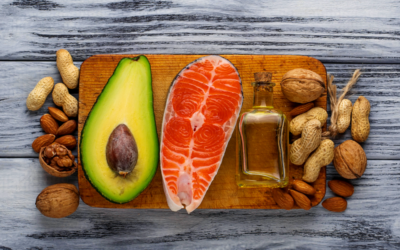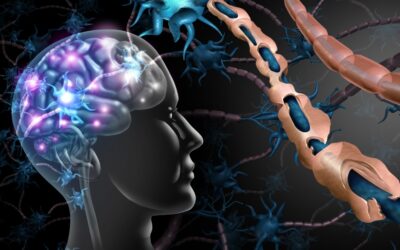Health Benefits of Omega-3 Fatty Acids and Recommended Foods
Omega-3 fatty acids are an integral part of cell membrane phospholipids. They provide structure, act as a barrier to protect cells from environmental aggression, and influence various bodily functions to help your body function at its best.
These “healthy fats” are essential fats, meaning your body cannot make them. So, you must obtain them from food or dietary supplements.
Here are three main types of omega-3s you can get from food: alpha-linolenic acid (ALA), docosahexaenoic acid (DHA), and eicosapentaenoic acid (EPA). DHA and EPA are abundant in fish, while ALA is mainly plant-based and found in vegetable oils.
Science-Backed Benefits Of Omega-3 Fatty Acids
Wondering what omega-3 is good for? Read on to explore its top benefits, and you might find yourself on the hunt for foods that up your omega-3s intake:
Beneficial For Mental Health
Omega-3s could help ease symptoms of depression and may even help curb anxiety. It likely does this by contributing to the development and maintenance of certain pathways in the brain, such as the dopamine system.
Dopamine is the “reward center” of our brain, so omega-3 supplements may prevent or treat certain psychiatric disorders like schizophrenia and Parkinson’s disease.
Combat Obesity
Omega-3 fatty acids may play a role in improving body composition, going so far as to counteract obesity-related metabolic changes. So, they could help you shed pounds, but only when used with mechanisms like modulating lipid metabolism.
Ease Inflammation
EPA and DHA from omega 3 fish oil have potent immunomodulatory activities. Hence, they could have significant benefits in the treatment of many health conditions, including rheumatoid arthritis, Crohn’s disease, and ulcerative colitis.
Improve Eye Health
Omega-3 fats ensure better functioning of meibomian glands. These glands produce oil to moisturize the eyes, making it effective for relieving dry eyes. However, participants also saw similar benefits with a placebo, so there’s no telling for sure.
And it could reduce the risk of developing Age‐related Macular Degeneration (AMD).
Prevent Age-Related Mental Decline
In older adults, omega-3 fatty acids could help prevent or treat cognitive decline. Fish oil could also improve the cognitive function of Alzheimer’s patients; however, the benefits are applicable at disease onset with mild symptoms.
Prevent Cancer
Omega-3s can have beneficial effects on cancer-related complications like pain.
Not only that, they could also delay or reduce the risk of breast or prostate cancer. Increased consumption could also prevent colorectal cancer. However, findings about the efficacy of omega-3 fatty acids have been mixed, with some saying their effects on our health are minimal, so more research is required for a definitive stand.
Promote Prenatal Growth and Development
Omega-3 fatty acids are important for offspring neurodevelopment.
So, adequate consumption of fish oil supplements could improve early language and cognitive development in infants, help them achieve gross motor milestones earlier, and reduce the impact of emotional and behavioral problems.
Mamas can also benefit from adding omega-3 to their diet, as it has been shown to prevent preterm labor and delivery and reduce the risk of postpartum depression.
Support Heart Health
Omega-3 fatty acids can reduce the risk of cardiovascular events like heart attacks, and it may even lower your chances of developing myocardial infarction or death from Coronary Heart Disease (CHD) Or Cardiovascular Disease (CVD).
As to how it works, it is believed that omega-3 can reduce blood triglyceride levels, a type of fat that can increase your risk of heart disease when found in excess.
Support Joint Health
Daily intake of omega-3 fatty acids can delay the onset of arthritis. Additionally, it can improve bone quality and reduce inflammation, which would decrease morning stiffness and the number of tender and swollen joints in patients with rheumatoid arthritis and other inflammatory joint conditions.
What Are Omega-3 Fatty Acids Foods?
Consume these omega-3 foods to keep yourself in peak health:
1. Caviar
6,540 mg of EPA and DHA (combined) per 3.5 ounces (100 grams)
Caviar is roe or eggs sourced from wild sturgeons. They’re considered a delicacy with a briny and salty flavor and are best consumed raw right off the spoon, although you can also pair them with crackers or crêpes for a superior flavor and texture combo.
It is a good source of omega-3 and choline, which is said to aid memory function.
2. Chia Seeds
5,050 mg of ALA per ounce (28 grams)
Chia seeds are highly nutritious edible seeds of Salvia hispanica. The mild, nutty flavored seeds are the richest source of omega-6 fatty acids, contain all nine essential amino acids, and are a good source of fiber, selenium, calcium, and manganese.
Chia seeds can protect your heart and liver and offer anti-cancer properties and anti-inflammatory benefits. It may also play a role in weight loss.
3. Flaxseeds
2,350 mg of ALA per tablespoon (10.3 grams)
Flaxseed, one of the world’s oldest crops, is a rich whole food source of ALA. Its mild, nutty seeds are often milled to extract oil, which is used as an omega-3 supplement. It also contains a good amount of dietary fiber, which can enhance gut health and prevent weight gain.
4. Mackerel
4,580 mg of EPA and DHA (combined) in 3.5 ounces (100 grams)
Mackerel is a small, fatty fish that is best enjoyed smoked or flaked in place of chicken in dishes. It is high in nutrients, packing much more than the daily requirement of B12 in a serving, is a “complete protein”, and does not contain carbs.
5. Oysters
391 mg of EPA and DHA (combined) per 3.5 ounces (100 grams) of raw eastern oysters
Oysters are chewy, fresh-flavored seafood that can be enjoyed as a delicacy or a whole meal. They are a zinc powerhouse, an essential mineral involved in cellular metabolism. The bivalve mollusks also contain a decent amount of omega-3 fatty acids and essential nutrients like vitamin B12.
6. Salmon
2,150 mg of EPA and DHA (combined) in 3.5 ounces (100 grams)
Salmon is a nutrient-dense food bursting with high-quality proteins, potassium, omega-3s, and essential nutrients. It can support bone health, reduce signs of aging, prevent muscle loss, and reduce the risk of diabetes-related side effects.
7. Sardines
982 mg of EPA and DHA (combined) per 3.5 ounces (100 grams) of canned Atlantic sardines
Sardines are small, oily fish that pack omega-3 vitamins. This delicacy has a unique salty and savory flavor profile, which you can take to the next level by grilling.
8. Soybeans
1,440 mg of ALA per 3.5 ounces (100 grams) of dry, roasted soybeans
Soybeans, members of the legume family, contain isoflavones—which help prevent cancer, fiber, and protein. It’s also an excellent source of omega-3s.
9. Walnuts
2,570 mg of ALA per ounce (28 grams)
Walnuts contain phenolic antioxidants and omega-3 fatty acids, which makes them beneficial for maintaining cardiovascular health and have anti-inflammatory effects. They’re also loaded with fiber, making them an asset for weight management.
What Can You Do If Your Diet Doesn’t Help You Meet Your Body’s Omega-3 Requirements?
You supplement your diet with supplements.
The 2015-2020 dietary guidelines recommend eating 8 or more ounces of seafood per week to meet your body’s omega-3 requirements. However, if you cannot incorporate them into your diet, you can use dietary supplements to get these fatty acids.
Here are some options to check out:
- Algal oils
- Cod liver oil (or any other fish liver oil)
- Oil fish omega-3
- Flaxseed oil
- Krill oil
Supplements omega 3 could interact with certain medications like aspirin, warfarin (Coumadin), and meloxicam, and cause very harmful effects. Talk to your healthcare provider before incorporating them into your diet to be on the safe side.
In Conclusion
As you can tell, omega-3 fatty acids, taken through food or supplements, can do wonders for your overall health. While research about benefits is inconclusive, one thing is clear—it won’t do more harm than good when taken in safe amounts.
Maple Roasted Salmon Recipe
Maple Roasted Salmon Maple Roasted Salmon is so delicious and easy to make. We are sure you’ll want to add this recipe to your menu plan each week. Searing salmon in a pan before baking it in the oven helps to lock in juices and flavor. Why is salmon so good for the...
Health Benefits of Broccoli Sprouts
Broccoli Sprouts Broccoli sprouts may be small in size, but they pack a powerful punch when it comes to health benefits. These tiny sprouts are loaded with nutrients and antioxidants that can help protect against a range of health issues, from cancer to heart disease....
Is Reverse Osmosis Water Filtration Better For You?
Water is essential for life, but not all water is created equal. Tap water can contain harmful contaminants and chemicals that can have adverse effects on our health. This is where reverse osmosis water purification comes in. Reverse osmosis (RO) is a highly effective...
Health Benefits of Daily Sunlight
Health Benefits of Daily Sunlight There are two sides to every coin—and two stories to tell about sunlight. Skincare enthusiasts and specialists, it seems, have taken a definitive stand against the sun, branding it as a villain that causes premature aging and leads to...
Benefits and Harms of Dietary Fat
Fat is one of three macronutrients found in food that is essential for cell survival in humans. However, it is often demonized as being “unhealthy”. But that couldn’t be further from the truth. Some fats have been linked to improved cognition and decreasing the risk...
Protein Improves Brain Health
Studies have shown that diets high in animal protein may help to prevent neurological conditions such as Alzheimer's disease and Parkinson's disease. Furthermore, there is a growing body of evidence that animal protein might be the key that unlocks the door to health...
Protein: Essential to brain health and repair
Protein, often referred to as the “building blocks of life” is arguably the most critical macronutrient for brain health and repair and disease prevention as we age. One of three macronutrients found in food the body is primarily composed of protein (second only to...
Simple versus Complex Carbohydrates
Carbohydrates are one of the three macronutrients that make up the foundation of our diet, along with protein and fat. They are found in a wide variety of foods, from fruits and vegetables to bread and pasta. Despite their importance in our diet, carbohydrates have...
Brain Health and Recovery: Food IS Medicine
Brain Health and Recovery: Food IS Medicine Food can be an excellent tool to enhance brain health and recovery. However, if you thought the brain was a complicated system to understand, the data on nutrition is far more complicated. So, spoiler, there is no “perfect...
Brain Derived Neurotrophic Factor (BDNF) and Brain Health
Brain-derived neurotrophic factor (BDNF) is a protein that aids in cell function and promotes the growth of new nerve cells (neurogenesis). Studies have shown that BDNF plays a critical role in neuroplasticity (the brains ability to build new nerve connections) and...











